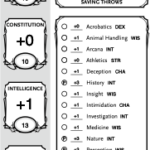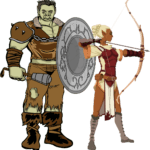Critical Success: Giving Players Every Advantage

One of the bugbears goes down, and another one is hurting pretty badly. A third one looks at the other two and seems to be panicking. She says, “What are we going to do? If we go back empty-handed, we’re dead.” They look at you and seem to be trying to decide whether to attack or flee.
A short conversation later between the party and the bugbears, and the party now has four bugbears fighting alongside them as the party promised to protect them from the Big Bad that sent them.
As Dungeons & Dragons continues to grow in popularity, well beyond the number of players during its height in the 1980s, people have found that social media and other shallow forms of communication are inferior to gathering around a table and sharing stories, strategies, and jokes with each other. It’s easier to cope with day-to-day life in the real world when you can escape with some friends into a fantasy world for a little while, but as shared universes continue to grow in popularity, we realize that these universes draw us in as we see the similarities to our own. This allows us to take the challenges of life and put them into a new context to take a fresh look at them and find new approaches to real-world problems.
Welcome to Caphora: The Divided Continent. Designed to take advantage of the game’s ability to bring different people together to accomplish a common goal, whether you use this campaign world, one published by Wizards of the Coast, or one of your own design, you can use these principles as you Dungeon Master a game. As well, this works with any tabletop role-playing game, although my references will specifically refer to Dungeons & Dragons 5th edition.
What It Is:
Critical Success principles run through these methods, so I present to you a combination of principles and strategies that flow from each other. These principles include but are not limited to:
- Every person has inherent value regardless of what they have done or what has been done to them.
- Heroes create hope. Hope is caused by trust that the future is secure.
- Nobody is beyond redemption. Some may reject it, but they are not beyond it.
- The greatest power is love—not a feeling, but commitment to actively caring.
Experiential Learning
We learn best when we see the effects of our actions. In Dungeons & Dragons, we can explore the same situations we encounter in daily life but approach them from a new angle, then take what we have learned back into the real world situation.
Natural Consequences
Because the game world is designed to feel real, suspension of disbelief notwithstanding, actions have consequences. Both players and Dungeon Master learn from each other through various encounters and the results of those encounters.
Dialog inducing
Unique situations require unique approaches. The party must discuss how they will resolve the challenges they face and the possible consequences of their actions. Because the game is open-ended, they can be creative but also need to balance risk and reward. Different ideas will sometimes conflict with each other or build off each other.
How to see the world
I’ve often described my parenting style as, “I want to teach you how to think more than what to think.“ When someone knows how to think, that will guide them as they draw conclusions from what they learn. So critical thinking guides the process.
What It Isn’t:
Political
We hear politics all day long. It’s important, but it’s exhausting, and every platform is imperfect, so Critical Success is not about pushing an agenda but rather learning to form your own agenda and act on it.
Preachy
This may sound ironic, given my day job as a preacher, but nobody likes having information shoved down their throats. Critical Success is about presenting options, not laying down the law.
Judgmental
Every action has consequences. Some we can foresee, and some we can’t. Nearly every decision is imperfect on some level, so Critical Success embraces imperfection and alternate viewpoints as a means of learning about each other and the world.
What to see in the world
Just as a fantasy world is a place of wonder, this is even more true of the real world, so Critical Success helps players find love, hope, and joy in the real world not by pointing it out, but by offering a different angle from which to look and allowing them to notice the things that are important to them.
As I mentioned above, I’m writing this as a Christian pastor, so that viewpoint will probably be obvious, but I hope this will be valuable to all kinds of gamers, regardless of their religious background or beliefs. Our tables combine people with many beliefs and worldviews, And we welcome all and strive to use these very principles to make everyone feel welcome.
This article is the first in a series. I invite you to subscribe if you’re interested in the rest.




